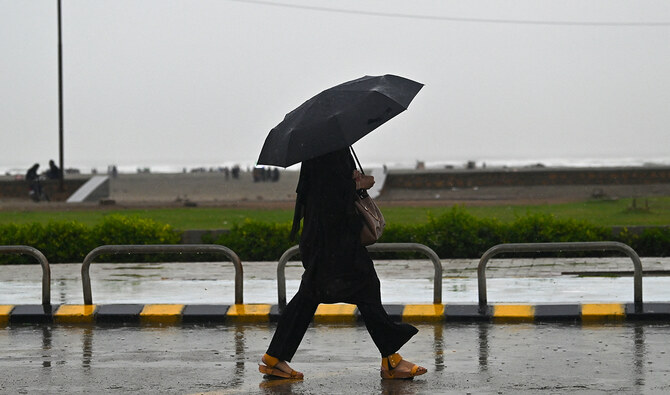KARACHI: The airport authorities in Pakistan’s seaside metropolis of Karachi on Saturday directed to relocate all aircraft at the Jinnah International Airport amid cyclonic warning, as different parts of the country are being lashed by heavy monsoon rains that have claimed 285 lives since the season began in July.
Earlier in the day, the Pakistan Meteorological Department (PMD) said cyclonic storm ASNA, brewing in the Arabian Sea, had moved westward.
The weather system, which developed over India’s Rann of Kutch coast, resulted in a deep depression that intensified into the cyclonic storm on Friday. The PMD said it was located about 200 kilometers southwest of Karachi and was likely to keep moving west-southwestwards.
“Airlines, ground handling and aviation companies operating in the general aviation area at the airport have been instructed to remain on full alert,” said an official statement by the airport authority. “Due to the stormy rains in Karachi, aircraft have been instructed to be parked in safe locations.”
“All aviation companies are advised to protect all their assets,” it added. “Stormy rains are expected to continue for the next few days.”
Pakistan has already been witnessing monsoon rains since the beginning in July, which, according to the National Disaster Management Authority, have claimed 29 lives in Balochistan, 88 in Khyber Pakhtunkhwa, 106 in Punjab, 50 in Sindh, four in Gilgit Baltistan and eight in Azad Jammu Kashmir.
No loss of lives has been reported in the capital city, Islamabad, so far.
The PMD alert during the day predicted that heavy rains could inundate low-lying areas of the Makran coast with sea conditions likely to remain rough.
The PMD also advised fishermen in Sindh and Balochistan provinces not to venture into the sea on Saturday.
“PMD cyclone warning center in Karachi is closely monitoring the system and will issue the update accordingly,” it added.
Heavy rains triggered flash floods in Karachi on Friday, causing power outages and closure of schools in the city.
Pakistan is recognized as one of the world’s most vulnerable countries to the effects of climate change. This year, the South Asian country recorded its “wettest April since 1961,” with 59.3 millimeters of rainfall, while some areas of the country faced deadly heat waves in May and June.
In 2022, unusually heavy rains triggered floods in many parts of the country, killing over 1,700 people, inflicting economic losses of around $30 billion, and affecting at least 30 million people.





















